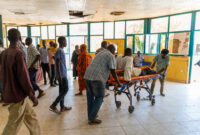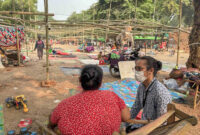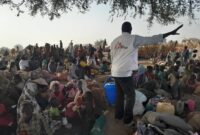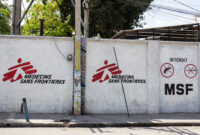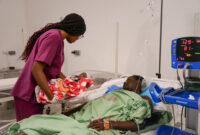MSF warns that reduced funding for Neglected Tropical Diseases could be devastating
Doctors Without Borders/Médecins Sans Frontières (MSF) reiterates its commitment to diagnosing and treating life-threatening NTDs in humanitarian settings as it signs the Kigali Declaration.
Today, MSF signed the Kigali Declaration on Neglected Tropical Diseases (NTDs), a high-level, political declaration which aims to ensure that these diseases are eradicated, eliminated or controlled by 2030. At the same time, MSF warned that reduced funding for NTDs in the wake of COVID could be devastating for people in low- and middle-income countries.
As NTDs mostly impact the poorest people, these diseases are often overlooked by policy makers, resulting in few resources being available to address them. For many of these diseases, there is no easy solution – diagnosis and treatment are difficult, expensive or not accessible for those in remote or underserved areas, or simply do not exist. NTDs often equal death or prolonged disability in the context of chronic poverty or humanitarian crises, such as population displacement.
MSF is one of the few actors caring for people with NTDs in remote areas where resources are scarce and health systems are fragile. Over the last thirty years, MSF teams have treated hundreds of thousands of people with Chagas disease (American trypanosomiasis), visceral leishmaniasis (VL or kala azar), cutaneous leishmaniasis, and sleeping sickness (human African trypanosomiasis) – all parasitic NTDs which affect impoverished people living in very remote and underserved areas. MSF not only helped identify new treatments and ways to diagnose people, but also played an active role in reducing the incidence of kala azar in Asia and sleeping sickness in Africa. In recent years, MSF has also expanded care for people affected by snakebite envenoming, Noma and cutaneous leishmaniasis.
Daniela Garone, MSF’s International Medical Coordinator:
“MSF strongly endorses the Kigali Declaration on Neglected Tropical Diseases (NTDs) and commits to continuing our response to these diseases, particularly for people affected by leishmaniasis, snakebite, noma and sleeping sickness, through diagnosis and treatment in the humanitarian settings where we work.
The significant progress that has been made towards controlling NTDs over the last decade has recently stalled due to the COVID pandemic as well as substantial aid cuts. Gains made in controlling the spread of diseases like visceral leishmaniasis are further in danger of disappearing largely due to major funding cuts by the UK government which was previously a key financial supporter of NTD programmes. MSF calls for broad support of the Kigali Declaration on NTDs, which is an important initiative for ramping up the global response to NTDs by prioritizing disease control and supporting the new ambitious WHO NTD Roadmap.
Having witnessed the challenges that people affected by NTDs face when seeking care and accessing treatment, MSF also calls for the development of new and more user-friendly medical tools that can simplify NTD care and better integrate it into countries’ health programmes. It is imperative that the world’s primarily profit-driven Research and Development (R&D) model is overhauled in order to make sure that desperately needed innovations for NTDs do not continue to be deprioritized because they aren’t lucrative for pharmaceutical corporations.
Additionally, the progress to control malaria has now stalled and is threatened by drug resistance, a lack of solutions in humanitarian settings, and insecticide resistance, which may be reducing the effectiveness of insecticide-treated bednets. In addition to NTDs, MSF is calling for an increase in global efforts to tackle malaria, through scaling up access to all available prevention and treatment tools.”
Adam Houston, Medical Policy & Advocacy Officer for MSF Canada:
MSF Canada also welcomes Canada’s support for the Declaration, while calling for Canada to live up to those commitments. We would particularly like to see Canada bolster its support for R&D for new treatments, vaccines and diagnostics for NTDs, including streamlining the path from laboratory to patient. Furthermore, these innovative new tools, as well as those tools that already exist, need to be both accessible and affordable for all who need them, wherever they live.
